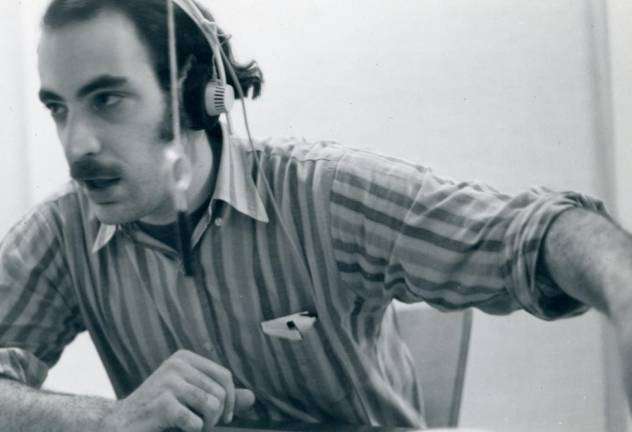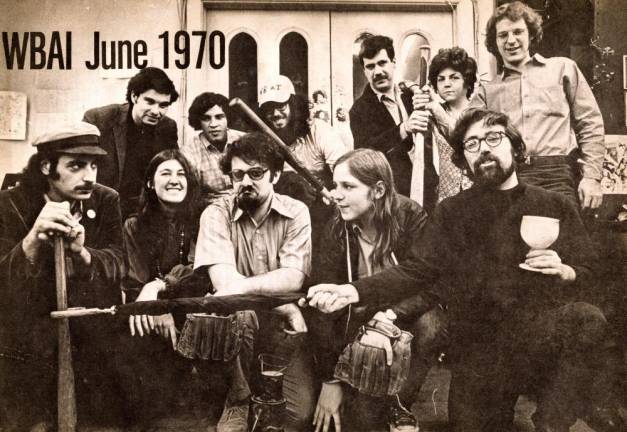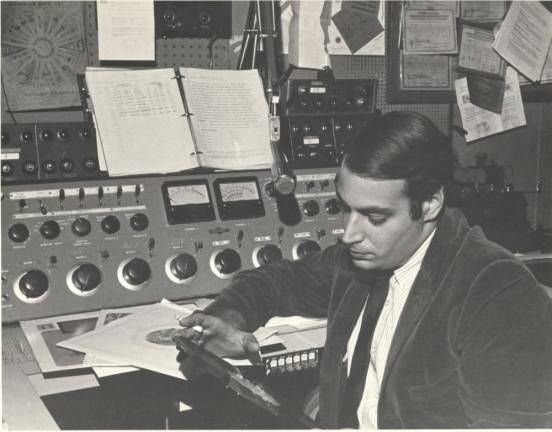From the Airwaves to the Big Screen
Filmmaker Rosemarie Reed celebrates Steve Post’s contribution to New York City radio



Before her foray into filmmaking, Rosemarie Reed worked at WBAI, the city’s iconic public radio station. In fact, it was its legendary host Steve Post who gave her her start there, and she began as development director, then was promoted to serve as its general manager.
The Brooklyn native went on to launch her own production company, where she’s made films on subjects such as Mikhail Gorbachev and women scientists like Irene Joliot-Curie, daughter of Marie. As for her newest project, “Playing in the FM Band: The Steve Post Story,” premiering at Film Forum on March 11, that came about after a conversation with a former coworker who revealed that it was Post who first hired her as well. When asked to describe the one-of-a-kind radio personality, Reed, who now lives in Tribeca, said that he “had this curmudgeonly exterior,” but “was really a very kind and generous person.”
At the start of the documentary, which is named after Post’s 1974 memoir, it’s explained that a new kind of radio was created in the 1960s at WBAI. That was free form, which was unlike the scripted FM radio that had come before it. For his contribution to this new era on air, Post, a Bronx native, was recognized as a pioneer in the field. He spoke about everything from Vietnam and President Nixon to his neuroses and health, which was uncommon back then. He also interviewed a transsexual woman in the late ‘60s, also groundbreaking at the time. Post was at WBAI for approximately 25 years and died in 2014.
How can you describe Steve in your own words?
He was a very wonderful, loving man, generous in spirit. And he never showed it. He was always like, “You’re annoying me,” but underneath it all he was a complete marshmallow. And I think that he saw talents in people and wanted to help ... When I listen to the programs that weren’t his funny programs, the programs he did on Debbie, the blind transsexual, he felt people’s anger, he felt people’s pain, and I think that that was part of his own pain. It’s no coincidence, in my opinion, that he called his show, “The Outside,” because I think Steve always thought of himself as being on the outside.
Tell us about the station WBAI.
The station has gone through many changes through the years. It went from once being a very important station in New York to becoming hardly able to pay the bills. And this is a very sad thing. The station was always eclectic, to say the least ... I personally hope it doesn’t go away and that we will always have a WBAI in New York City, but that remains to be seen. The station has always been on the margins, in terms of financial status. It was a chaotic place to work. There were rules, of course, but they often got broken. People have gone on to different arenas, as myself. I did go into radio for a while, but I was so in love with film that I made that transition.
Steve also worked at WNYC and helped fundraise millions of dollars for that station.
I was not at NYC, so I don’t know all the details, I just know what Laura Walker, who was the manager at the time, [told me], which is that then-Mayor Rudy Giuliani tried to sell the station to the highest bidder and Steve went to the airwaves, as others at the station did, to thwart his efforts. Steve raised millions of dollars toward this effort. Walker stated that WNYC is here in New York City because of Steve.
I thought it was nice that you included the fan letters he received.
The fan letter that he got at the end, from Elena Climent, this is interesting. Laura [Rosenberg, Steve’s wife] gave me everything he saved. She gave me all his letters, good and bad, and my editor and I spent days looking through them. And I love that Elena is a great artist and I loved her letter. She lived in Mexico and we brought her up to New York because we thought that her presence on the film would be a real good addition and we wanted her to read her letter directly ... He was very sick for a while and on and off the air. But then at one point, he was taken off the air, and he got so many letters that said that WNYC really needed to bring him back, that he was a real asset to the station and New York City.
The story about him waiting outside President Nixon’s Upper East Side townhouse in his Honda was so interesting.
Yes, Nixon lived on 65th Street and Steve would park outside to see if he could meet up with him. And he did, not there, but a few years later, when he got to go to the recording session of his book.
In the late ‘60s, Steve had a transsexual woman on his show. Can you give us some details about that?
Debbie, yes. We tried to find her, by the way. We would love to have had her on the air. We went to The Lesbian, Gay, Bisexual and Transgender Community Center, The Lighthouse for the Blind, but we could never find her. She might not be alive. I’m still gonna look for her. I would love to talk with her and do something with her. But what happened was, she would call off air and she would ask for Steve and for about maybe a month of two, I’m not exactly sure, they would talk together. And then one day, he said to her, “Would you like to come up to the station and talk to my audience?” And I think after a little while, she agreed and she came up for this interview. And I think, after the interview, she and Steve remained in touch for a long time. And one of the things that was very good was that she was having trouble with The Lighthouse for the Blind. They would not allow her to go to many of the dances, the bathroom was an issue at that time. And Steve was outraged by it; he couldn’t believe it, so he called up a friend of his, who’s also a friend of mine, Neil Fabricant at the New York Civil Liberties Union, and he told him the story. Neil called The Lighthouse and told them that they were violating her rights and soon enough, she was allowed in and could attend.
In the film, it explains that Steve got the same cancer at the same age as his mother, who was 38 when she was diagnosed and died when Steve was 10.
And, of course, since things are better now, [with] better healthcare and improvements in cancer research, he lived to be 70 and didn’t die at 38, like his mother did. And his brother, Jerry, never got sick. I never knew Jerry. In fact, I think I met him for the first time when I brought him in for an interview.
What are you working on now?
I’m working on “Forgetting the Many: The Royal Pardon of Alan Turing.” The film “Imitation Game” with Benedict Cumberbatch, was about him. He was the person who broke the Nazi code and shortened the war by at least two years. He was one of the greatest scientists in the world and had he lived, he would have done much more. He was a homosexual in England in the ‘50s and there was a witch hunt for homosexuals and he was convicted of gross indecency. Instead of opting for two years in prison, he accepted chemical castration, which in the long run, it’s use is what ultimately made him take his own life. Our film looks at the thousands of gay men who were also convicted under the gross indecency laws but had not received a pardon.
www.filmforum.org/film/playing-in-the-fm-band-the-steve-post-story